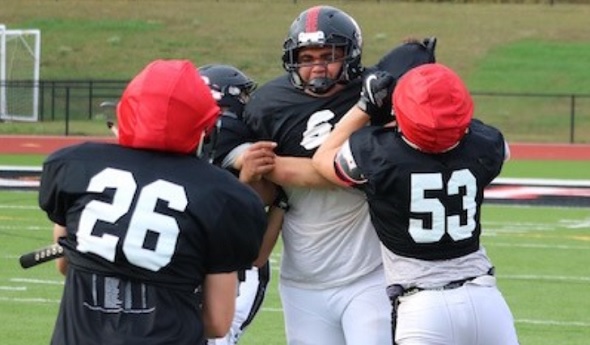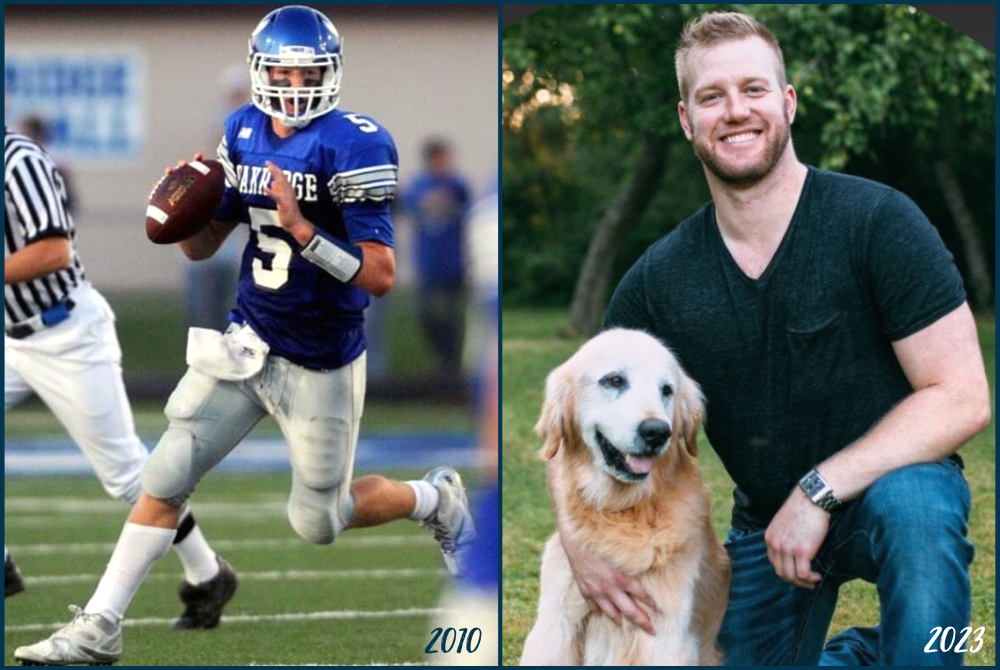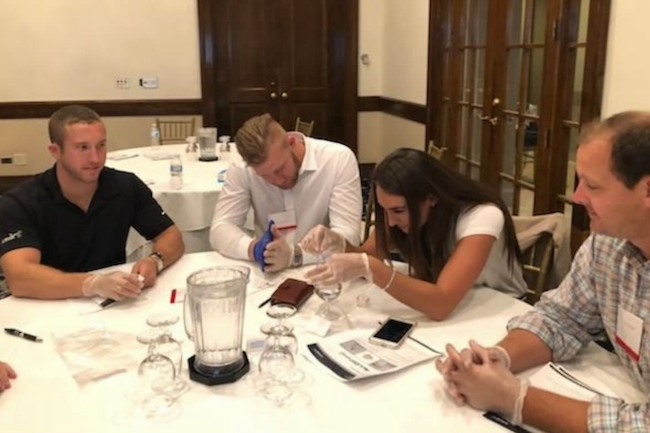
Ford Swaps Frustration for Focus
October 24, 2017
By Tim Robinson
Special for Second Half
Midway through the 2016 season, Marcus Ford was frustrated.
 He was on the Pinckney football team, but not playing much.
He was on the Pinckney football team, but not playing much.
A big part of that was due to his size — 6-foot-5 and over 400 pounds — but then-defensive coordinator Rod Beaton sensed there was more.
“We feel that we coach very hard,” said Beaton, now Pinckney’s head coach. “We’re very aggressive (on the varsity), and sometimes it’s an adjustment for juniors to understand that when they come out here, there’s expectations.
“There were a couple times where Marcus was questioning … whether football was for him.”
“I didn’t want to be there,” Ford said. “I thought, ‘This is stupid. Why am I here so late?’”
And then came a change.
“It came to a point where he went home and took a day off to re-gather himself,” Beaton said. “Marcus came back and he said to me, ‘Coach, I really want to be a part of things here.’”
And Ford did more than that.
He grew from a young man who bristled when his coaches pointed out mistakes to one who doesn’t react as if it were a personal attack, from an overweight kid who admits he was on his way to weighing 600 pounds to a big kid who is a key part of Livingston County’s most successful football team as a senior.
He rarely comes out of games, his coach says, and the quiet giant who rarely interacted with his teammates has transformed into a happy, smiling kid who dishes out and takes teasing from them.
It’s a story of transformation that only football could have done for Marcus Ford, who couldn’t play youth football because of his size and whose options for high school athletics seemed limited to football for the same reason.
“I may sound a little clichéd and corny,” Beaton said, “but I think this is why every single coach in America coaches football, to watch the development of a young man, from freshman to sophomore to junior and to see what football has done for him.”
How did Ford do it?
He turned his mental approach 180 degrees and made drastic changes to his diet and work ethic.
One clue came in looking at Pinckney’s roster from 2016 compared to 2017. Last year, Ford was listed at 380, which was about 40 pounds less than his actual weight.
This year, he’s listed at 405, which is a dozen pounds more than what he weighs now.
Last year, he played mostly in mop-up roles.
This year, he is a starter on defense, regularly occupying two blockers at a time, which in turn frees linebackers Cauy Hendee and Levi Collins to make tackles.
“I can play a lot longer,” he said. “I was tired when we were out there, but we don’t believe in the word ‘tired.’ We prefer ‘winded.’ We just need to catch our breath. So I get ‘winded’ a lot less.”
The first thing Marcus decided to change was his diet, and he got his cues by looking in the mirror.
“I didn’t like the muffin cap that was hanging down,” he said. “I didn’t like my stomach hanging over. ... I thought, ‘I don’t what to have a heart attack at age 25.’ I was doing ‘diets,’ per se, but eventually I thought, ‘This is stupid. Cut out pop and eat better,’ And I did.
“The only thing I would eat that was green was green beans, and they had to be made a certain way,” he said. “Now, I’m more like ‘this is somewhat appetizing. Let me try that.’ I don’t eat candy bars anymore. I don’t eat ice cream when my family does. I drink a lot less milk than I used to, and I drink more water.”
 Pinckney offensive coordinator Cody Patton noticed.
Pinckney offensive coordinator Cody Patton noticed.
“His mom came to me about getting a weight plan, and he stuck with it,” Patton said. “They can only do so much in the weight room. When they leave, there’s not much you can control what they put into their bodies.”
But Ford also changed his mindset about football and being coached.
“His first real commitment was ninth-grade high school football, and it was a big adjustment for him,” Beaton said. “We knew there would be days where he might be a little confrontational, there may be some days where he goes through the motions.”
But after that midseason meeting last year, Ford redoubled his efforts in practice and in the offseason.
The first hint that he was a different player came in June, when Ford earned the team’s first bone helmet sticker of the season for effort in a drill.
“It was our first pursuit drill,” Beaton said. “We go four downs, and those kids have to sprint. There’s no exception. Marcus stepped to his gap, made his reads, flew to the football and didn’t say a word, every single time. He did it four times in a row. It really set the stage. I could tell he was wanting do to things right this year.
“When you see a 6-5, 400-pound kid moving with effort and tenacity, you sit there and go, ‘That young man can help us.’”
And so he has.
As a result, Marcus Ford is part of a Pinckney defense that has lifted the Pirates to an 8-1 regular-season record and shared Southeastern Conference White championship. He has transformed from a player who had little stamina to one who can go from opening kickoff to final horn.
“He can play a whole football game,” Beaton said. “He can go through a whole practice. One of the challenges we were talking about in the offseason is he has to put his body and mind in a position to not come off the field.”
That moment came on a warm night early in the season.
“We were in a huddle at Chelsea, and it was late,” Beaton recalled. “He’s drenched in sweat, and I said, ‘Marcus, you need a breather?’ And he said, ‘No, coach. I’m ready.’ That’s pretty cool.”
Asked his ideal weight, Ford said, “I would like to be at 250 if I could,” then laughs. His bone structure is such that at his height, he would be almost gaunt at 250. “I would settle for 340. That’s the dream within a dream goal.”
Next year, he plans to attend college.
“I want to go into bartending or being a head chef, or get a business degree,” he said. “One other choice is going to a police academy. As long as I can run a mile within 15 minutes, I should be good.”
There’s no reason, now, to think he couldn’t accomplish that.
He got his first sack against Dexter.
‘I grabbed him and rolled him over on top of me,” Marcus said. “I would have liked to have landed on him, but I got him down in the backfield. It’s good.”
And football now is fun.
“A lot more fun,” he said.
“Marcus made a concerted effort to our strength and agility program,” Beaton said. “It wasn’t two days at a time, then not be there five or six days. Marcus was there. He would stay after everyone had left and get some extra lifts in or do some extra work to make sure he was putting himself in a (good) position.
“He said, ‘Coach, I want to be your starting nose (tackle).’ The first day of June camp, he ran out to the nose tackle, and we haven’t looked back.”
PHOTO: (Top) A pair of Pinckney blockers try to contain nose tackle Marcus Ford during a practice this season. (Middle) Ford breaks free to get an arm on a ball carrier. (Photos by Tim Robinson.)

Oakridge 3-Sport Star Potts Applying Lessons to 'Second Chapter' in Sales
By
Tom Kendra
Special for MHSAA.com
July 20, 2023
Jamie Potts put a major strain on his feet and ankles for many years.

Potts was constantly twisting and contorting in cleats and sneakers as a three-sport standout at Muskegon Oakridge and later as a rare two-sport star at Grand Valley State University, where he is still listed in the school’s football and baseball record books.
So it’s fitting that the 30-yeaar-old Potts is now helping to heal feet and ankles as a medical device salesman for Stryker.
“It’s a very competitive, fast-paced job and lifestyle,” said Potts, who graduated from Oakridge in 2011.
“I am very thankful for that because there is a huge void there. When you put so much of your time and energy into it, transitioning out of competitive sports is difficult.”
Potts is the youngest of four boys, so he practically grew up in the bleachers at Oakridge. By the time he got to high school, he fell effortlessly into the rhythm of football in the fall, basketball in the winter and baseball in the spring – all while maintaining a 4.1 GPA, good for fifth overall in his class.
Potts did everything on the football field at Oakridge, as a 6-foot-3, 200-pound dual-threat quarterback. As a senior, he rushed for 1,561 yards and 24 touchdowns and threw for 696 yards and 10 TDs – along with totaling 64 tackles and successfully booting 9-of-13 field goal attempts.
“He was a fantastic high school athlete and one of the best athletes to ever come out of Oakridge,” said former Eagles coach Jack Schugars, the all-time winningest high school coach in the Muskegon area who is now the special teams coordinator at Ferris State. “He was a tremendous leader and the epitome of a role model for younger kids.”
Potts was a solid, if not spectacular, basketball player, known as a defensive specialist who wasn’t afraid to guard anybody.
Then in the spring, he was back to all-state status in baseball as an outfielder, batting .584 his senior year with six home runs, 38 RBIs and 34 stolen bases.
That meant it was decision time when it came to college – would it be football or baseball?
Potts received several Division I offers, including from Central Michigan University for football and Oakland University for baseball.
But it was Division II Grand Valley, particularly then-assistant coach Matt Yoches (now the director of football operations at Miami of Ohio) that floated the possibility of playing both sports – a very rare feat at the DII level.
Potts made the GVSU coaches look like geniuses. He was a four-year starter at tight end and receiver, finishing his career second all-time for the Lakers in TD receptions (35) and third in career receptions (169). In baseball, he finished with 241 career hits, the fifth-most in school history at the time.
“People told me that playing both in Division II wasn’t realistic,” said Potts, who now lives on the east side of the state in Fenton, with his 1-year-old daughter, Brooklyn. “But I wanted to give it a shot and I think I did all right with it. Growing up in Oakridge, my life was all about sports, so it prepared me.”
 Potts was drafted by the Texas Rangers shortly after his senior collegiate baseball season in 2015 and played that summer for Class A Spokane (Wash.), batting .217 with four home runs in 57 games. He missed training camp and the first two games of the 2015 football season, but returned to help the Lakers to the DII Semifinals his senior year.
Potts was drafted by the Texas Rangers shortly after his senior collegiate baseball season in 2015 and played that summer for Class A Spokane (Wash.), batting .217 with four home runs in 57 games. He missed training camp and the first two games of the 2015 football season, but returned to help the Lakers to the DII Semifinals his senior year.
He prepared to resume his baseball career and left in late February for the Rangers spring training complex in Surprise, Ariz., before announcing his retirement in March with a long and heartfelt Facebook post, which concluded:
“My best advice I can give is that you should always chase your dreams until your heart says it’s time to stop,” Potts wrote. “No matter how far out of reach you think it is or how old you are, you can do it with enough hard work and preparation.”
Potts, who completed his degree in allied health sciences with a minor in psychology during the Lakers’ 2015 football run, then had to shift gears and find his place in the “real world,” outside of competitive sports.
Potts said Oakridge, in addition to being a hard-working sports community, also did a mighty fine job preparing him and his three older brothers, sons of Tom and Kathy Potts, for life after athletics. Oldest brother Chris is an engineer, Andy works as a logistics manager and Aaron is an orthopedic surgeon.
It was actually Aaron who pointed him in the direction of medical device sales. He went through five interviews shortly after his retirement before landing his first job in the field at Arthrex in Grand Rapids, before moving on to Kalamazoo-headquartered Stryker last year.
“A big part of my job is being in the operating room with the surgeons and making sure that everything is working,” explained Potts, who is part of a six-member team which covers much of eastern Michigan. “It’s very intense, very much like the feel of a close game. No doubt all of those years of sports help me every day.”
But Potts could not leave sports behind completely after his baseball retirement.
He was back in Muskegon in the spring of 2016 and attended a Muskegon Ironmen indoor football game. He spoke with team owner TJ Williams, who Potts used to watch playing for Oakridge as a kid, and a few weeks later, he was in an Ironmen uniform.
Potts played two years with the Ironmen as a receiver, linebacker and kicker.
“It was a lot of fun, really, getting to play in front of fans in Muskegon again,” said Potts. “The worst part was the walls. I’ve never experienced getting tackled into walls before and, I tell you, that takes some getting used to.”
More recently, Potts helped out last month as a coach at Schugars’ kicking camp at Oakridge, getting him back on the turf at Russell Erickson Stadium, where the field is now known as Jack Schugars Field.
“I’m happy to be a role model for kids,” said Potts. “You learn so many life lessons from playing sports. It really gets you ready for the second chapter of life.”
2023 Made In Michigan
July 18: Frankfort Hoops Staff Bolstered by Past Stars Giving Back in Banktson, Kreski - Read
July 12: Championship Memories, High School Tennis' Impact Stick with Hackett Pair - Read
July 6: Brother Rice Finals Hero Aiming to Ace Family Life, Financial World - Read
July 5: Lapeer West 4-Time Finals Winner Set to Build Champions at Oklahoma - Read
PHOTOS (Top) Jamie Potts runs the offense for Muskegon Oakridge as a senior in 2010, and now. (Middle) Potts, second from left, is advancing in his career in medical device sales. (Photos courtesy of Jamie Potts.)

